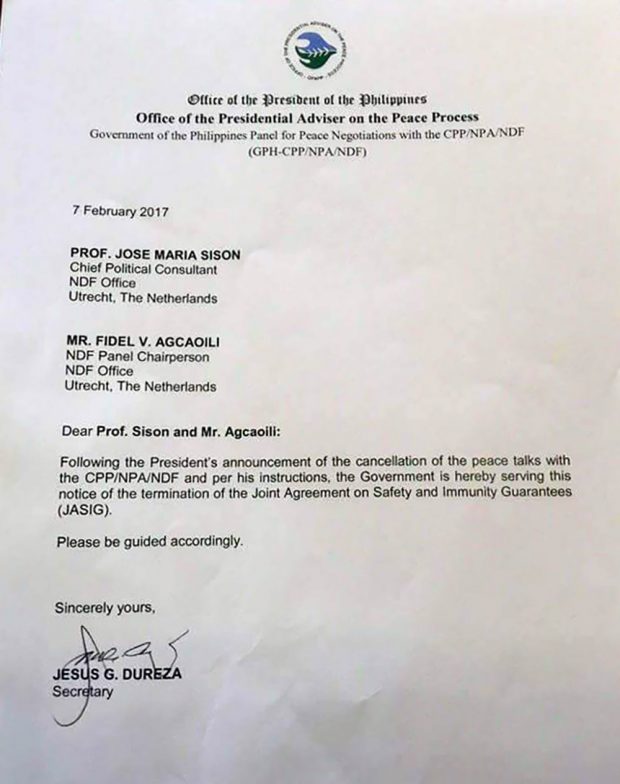THE Government of the Republic of the Philippines (GRP) formally served the National Democratic Front of the Philippines (NDFP) notice of termination of their Joint Agreement on Safety and Immunity Guarantees (JASIG).
In a letter dated today, Presidential Adviser on the Peace Process Jesus Dureza also told NDFP chief political consultant Jose Maria Sison and NDFP Negotiating Panel chairperson Fidel Agcaoili of the GRP’s “cancellation” of the peace talks.
“Following the President’s (Rodrigo Duterte) announcement of the cancellation of the peace talks with the CPP/NPA/NDF (Communist Party of the Philippines/New People’s Army/NDFP) and per his instructions, the Government (GRP) is hereby serving this notice of the termination of the Joint Agreement on Safety and Immunity Guarantees (JASIG),” the letter said.
In a subsequent statement issued by his office, Dureza referred to Duterte’s earlier labelling of the Left as “terrorists.”
“The Government will continue its vigilance in the preservation of law and order and in protecting our people against insurgent activities and threats of terrorism,” Dureza’s statement said.
The NDFP has yet to respond to Dureza’s letter and statement.
Dureza, GRP Negotiating Panel chairperson Silvestre Bello III, Agcaoili and Sison were co-signatories of the 1995 agreement.

GRP’s JASIG termination letter.
30-day grace period
Signed on February 24, 1995 in Nieuwegein, The Netherlands, the JASIG came into effect after the respective approval by NDFP Chairperson Mariano Orosa on April 10, 1995 and GRP President Fidel Ramos on April 25, 1995.
The agreement was intended to protect negotiators, consultants, staffers, security and other personnel who participate in the GRP-NDFP peace negotiations.
JASIG was also intended “to facilitate the peace negotiations, create a favorable atmosphere conducive to free discussion and free movement during the negotiations, and avert any incident that may jeopardize the peace process.”
“Without the JASIG, negotiations would not be possible. Without the JASIG, persons involved in the negotiations would always feel or actually be under a cloud of threat and would be unable to perform their functions freely,” human rights group Karapatan said of the JASIG on its website.
The negotiations would always be at risk of being disrupted and totally jeopardized without the JASIG, Karapatan said.
The JASIG allows one party to terminate the agreement through a written notice given by one party to the other.
“In (such an) event, this Joint Agreement shall be deemed terminated 30 days after receipt of the notice of termination,” the agreement said.
According to JASIG, the termination shall take effect on March 9.
Repeatedly violated by the GRP
The NDFP has repeatedly accused the GRP of violating JASIG with the arrest of its peace consultants and personnel.
The GRP judiciary has released 19 NDFP peace consultants last August that enabled them to participate in the three formal rounds of talks in Norway and Italy.
Duterte has verbally ordered their rearrest, however, in an outburst last February 5 in Cagayan de Oro City.
The NDFP for its part said Duterte and the GRP executive branch has no jurisdiction over the released consultants but the respective trial courts where complaints are lodged against them.
Yesterday, combined GRP military and police elements arrested peace consultant Ariel Arbitrario in Davao City, bringing to four NDFP consultants under GRP custody even before Dureza’s notice and the JASIG’s termination on March 9. (Raymund B. Villanueva)

